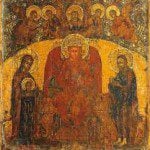Almost 10% of churches surveyed nationally will close this Sunday because of Christmas. Although some denominations have a different understanding of the Sabbath than the Catholic and Eastern Orthodox churches, it’s still  worth exploring the overall impact it could have on faith. Specifically, what message does it send? What is the perception? Does it suggest that Christians themselves are more responsible for secularizing the country?
worth exploring the overall impact it could have on faith. Specifically, what message does it send? What is the perception? Does it suggest that Christians themselves are more responsible for secularizing the country?
John Paul II observed that “East (Orthodoxy) and West (Catholicism) are the two lungs by which the Church breathes; their unity is essential to the healthy life” of the one, holy, universal, and apostolic church.
The Orthodox distinguishes Saturday Sabbath from the Lord’s Day of Sunday. The Eastern Church, while respecting the Saturday Sabbath and celebrating the Divine Liturgy on it, give more attention to Sunday because it is the day of Christ’s resurrection (Matthew 28:1; Mark 16:2,9; John 20:1,19). Similarly, though with some theological distinction, Catholicism while respecting the Saturday Sabbath also focuses on Sunday.
Very early on the Holy Fellowship Meal was celebrated on Sundays (Acts 20:7). In Revelations (1:10), Sunday is the new day of rest in Christ. Several of Paul’s letters emphasize Sunday over Saturday referring to a new Sabbath with Saturday being a forerunner (Corinthians 2:16-17; 1 Corinthians 16:2; 2 Thessalonians 2:15; Hebrews 4:8-9; Hebrews 7:12). Think John the Baptist as the forerunner to Jesus. Paul, however, also teaches that “whichever day you choose is acceptable” (Romans 14:5-6).
Early Church Fathers in the 1st, 2nd, and 3rd centuries taught that Sunday was the new Sabbath. They included Didache, Ignatius, Clement of Alexandria, Tertullian, Victorinus, Athanasius, and John Chrysostom. Over time several Protestant denominations accepted the Lord’s Day as a time for rest and prayer. Hence, widespread belief has been to accept Sunday, the day of resurrection in Christ, as the Sabbath, but without disregarding Saturday.
Decisions to close houses of worship have little, if anything, to do with theology. Otherwise it would be ongoing. Why not close one or two Sundays every month? Reasons given by mega church pastors include the difficulty to find enough volunteers to service the service on Christmas Sunday. Although the need for a full contingent of volunteers is unnecessary, perhaps it’s still too difficult to rope off seating to enable a more intimate setting for Sunday worship.
Another reason offered for closing is that recognition and celebration of Christmas didn’t occur until the 19th century among many Protestants. It’s implied that too much importance is placed on the holiday. Although there  is some legitimacy in giving too much attention to a co-opted Pagan holiday, if that’s the reason then there is no reason to close on Christmas day that falls on any day. Considering the ongoing concerns that faith is under attack in America, especially when “Happy Holidays” is replacing “Merry Christmas,” Sunday’s without worship because of Christmas seems odd.
is some legitimacy in giving too much attention to a co-opted Pagan holiday, if that’s the reason then there is no reason to close on Christmas day that falls on any day. Considering the ongoing concerns that faith is under attack in America, especially when “Happy Holidays” is replacing “Merry Christmas,” Sunday’s without worship because of Christmas seems odd.
Paul is author of Crucifying Jesus and Secularizing America – the Republic of Faith without Wisdom.
© Paul Peter Jesep 2011











